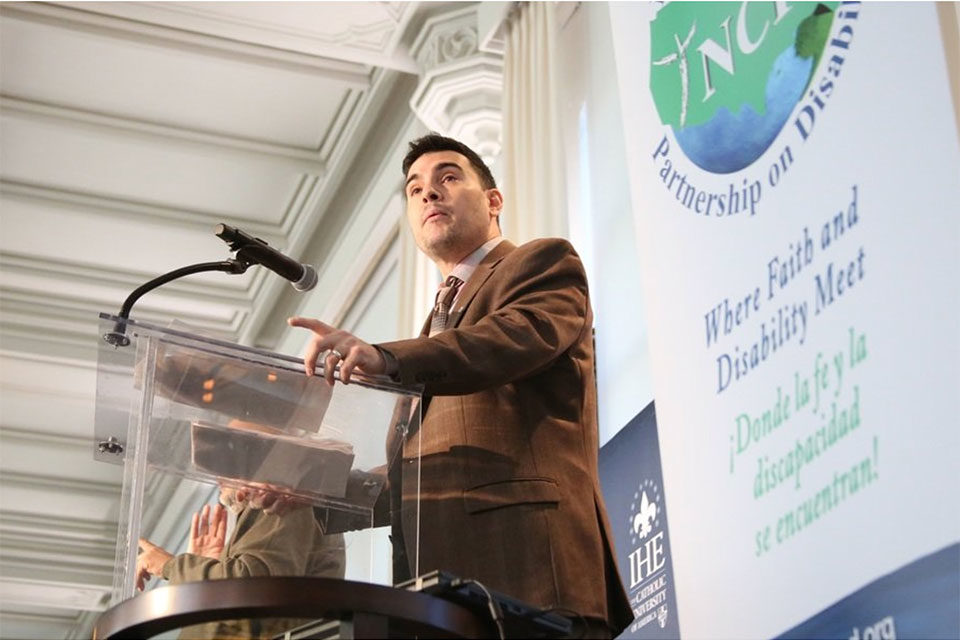Romero presents keynotes on disability at Catholic University symposium

Dr. Miguel Romero, assistant professor in the Department of Religious and Theological Studies, presented two keynote lectures probing a deeper understanding of “disability” and its relation to Christian teachings about human dignity during a Catholic University of America symposium sponsored by the U.S. Catholic Conferences of Bishops and the National Catholic Partnership on Disability.
The symposium, “Recognizing the Body of Christ: A Theological Engagement on Disability,” brought together theologians, seminarians, university students and leaders in ministry to think about the meaningful participation of persons with disabilities in the church in light of the Catholic intellectual tradition. Romero presented “Wonderfully Made: Creation, Human Dignity and the Gift of Vulnerability” and “Called to Beatitude: Our Wounds, God’s Grace and the Sacraments of the Church.”
In his talks, Romero explored the Christian understanding of what it means to be human, referencing the thinking of St. Thomas Aquinas on vulnerability, as well as the works of the Pastoral Constitution from the Second Vatican Council. He also referenced a former Salve Regina student who he credits for pushing his own approach to understanding how the gospel challenges some of our most precious presumptions about the significance of disability.
Every time Romero teaches Disability, Vulnerability and Human Flourishing at Salve Regina, he begins by asking students to explain why they signed up for a theology course with the word “disability” in the title. Most mention the circumstances of a family member or a friend. Four years ago, “Maria” (not her real name) was sitting in his class in the front row, way off in the corner so she could quickly leave the room because the medication she had to take left her in a constant state of nausea.
“Her condition leaves her in chronic pain and eventually results in various degrees of paralysis in the arms and legs,” Romero said. “She is a devout Catholic and the convictions and confidence of her faith was crystal clear.”
Although her illness was the circumstance that inspired her interest in the class, “Maria” had also compiled a list of theological questions that Romero found inspiring.
“She had developed an impressive understanding of the nuances of her condition, but she wanted to learn how to think about the reality of her condition in the light of her faith,” Romero said. “She wanted to understand her circumstances and her experience in relationship to the faith of the church. And she wanted to know how to investigate and how to articulate in her own words the reasons for her hope.”
That experience helped frame Romero’s approach to his symposium presentations. “Faith seeking understanding,” he told his audience. “It’s a good way to think about the work of Christian theology. And a good way to think about our collective, common purpose at this symposium. A symposium that has the word ‘disability’ in the title.”
Did God make a mistake in giving us bodies that are vulnerable? Do all the defects, impairments, illnesses and disorders of our bodies diminish our dignity or signal a disqualification from God’s providential intent for the human being?
“Christian doctrine on human dignity has always included an affirmation that the vulnerability and the dependency of our bodies is consistent with our special place in the good order of God’s creation,” Romero explained. “We’re fragile creatures whose freedom is forged in the dynamic dance of our limitations and dependencies. This limitation, this weakness is where Christ meets us.”

